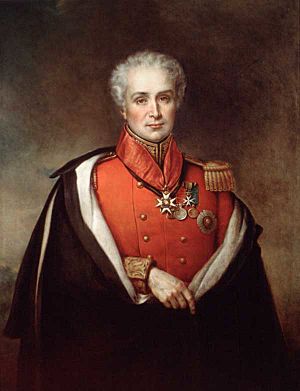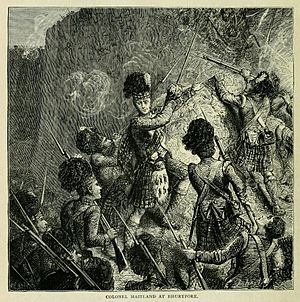Peregrine Maitland facts for kids
Quick facts for kids
Sir Peregrine Maitland
|
|
|---|---|

Maitland c. 1882-1883
|
|
| Born | 6 July 1777 Longparish, Hampshire, Great Britain |
| Died | May 30, 1854 (aged 76) Eaton Place, West London, UK |
| Allegiance | Great Britain |
| Service/ |
Foot Guards |
| Years of service | 1791–1836 |
| Rank | General |
| Commands held | Madras Army |
| Battles/wars | Haitian Revolution French Revolutionary Wars Napoleonic Wars Second Anglo-Maratha War Siege of Bharatpur (1805) |
| Other work | Lt. Governor of Upper Canada Lt. Governor of Nova Scotia Governor of Cape Colony |
General Sir Peregrine Maitland (born July 6, 1777 – died May 30, 1854) was a British soldier and leader. He was also a talented first-class cricket player. Later in life, he suggested setting up schools for Indigenous children in Canada.
Contents
Early Life and Family Background
Peregrine Maitland was born in a place called Longparish House in Longparish, Hampshire, England. He was the oldest of five sons. His father, Thomas Maitland, owned plantations. His mother, Jane, was the daughter of a general named Edward Mathew.
A Soldier's Journey: Military Career
Maitland joined the army when he was just 15 years old. He started as an ensign in the 1st Foot Guards.
Early Battles and Promotions
He fought in Flanders in 1794 and became a lieutenant. In 1798, he was part of a landing in Ostend that wasn't successful. He also served in the Peninsular War, fighting in battles like Vigo and Corunna. For his bravery at Corunna, he received a special medal. He also took part in the Walcheren in 1809.

Hero at Waterloo
Maitland fought with great courage at the Quatre Bras and the famous Battle of Waterloo. Just before Waterloo, he was promoted to major general. On June 18, 1815, the day of the Battle of Waterloo, he led two groups of the 1st Foot Guards. Each group had 1,000 soldiers. He led his Guards in stopping the final attack by the French Imperial Guard.
For his service at Waterloo, Maitland received several important awards. These included the Knight Commander of the Order of the Bath from Britain. The 1st Foot Guards also earned the special name 'First or Grenadier Regiment of Foot Guards' because of their bravery.
Leading in the Colonies: Lieutenant Governor Roles
After his military career, Maitland took on important leadership roles in different parts of the British Empire.
Governing Upper Canada
In 1818, he became the lieutenant governor of Upper Canada (which is now part of Ontario, Canada). He supported a powerful group there called the Family Compact. He tried to reduce American influence in the colony. He also suggested setting up schools for Indigenous children. He believed these schools could help children learn new skills like farming. He thought this would help them adapt to new ways of life. His time in Upper Canada ended in 1828.
Leading Nova Scotia
From 1828 to 1834, Maitland served as the lieutenant governor of Nova Scotia. He was well-liked there. He set a good example with his strong moral behavior. For instance, he stopped Sunday military parades, which were a big social event. He also spoke out against open markets on Sundays.
Maitland helped resolve a dispute about Pictou Academy. He also worked on settling immigrants in Cape Breton. He made sure lands were properly set up for the 4,000 immigrants expected that year. In 1832, he went back to England for health reasons and never returned to North America.
Other Important Roles
Maitland later went to India. He became the commander-in-chief of the Madras Army from 1836 to 1838. In 1844, he became the Governor of the Cape Colony in South Africa. He was removed during a conflict called the Xhosa War. However, he is still respected in Lesotho for his fair judgment on a border issue.
Playing Cricket
Sir Peregrine Maitland was also a keen amateur first-class cricket player. He played in 27 known matches between 1798 and 1808. He mostly played for the Marylebone Cricket Club (MCC). He also played for teams from Surrey and Hampshire.
Family Life
Peregrine Maitland was the eldest of five sons. He had three sisters. One of his aunts married James Austen, who was the brother of the famous writer Jane Austen.
Maitland was married twice. His first wife, Louisa, passed away in 1805. He then married Lady Sarah Lennox in Paris in 1815. Lady Sarah was the daughter of the 4th Duke of Richmond. The Duke of Wellington helped them get married. Later, when Lady Sarah's father became Governor-in-Chief of Canada, he appointed Maitland as Lieutenant-Governor of Upper Canada.
Maitland had one son with his first wife. With his second wife, he had at least seven children. He is a distant uncle of the famous composer Andrew Lloyd Webber.
Maitland in Stories
In his famous novel Les Misérables, writer Victor Hugo mentions Maitland. He suggests that Maitland asked the French Imperial Guard to surrender at Waterloo.
Lasting Legacy: Places Named After Him
Many places are named after Sir Peregrine Maitland, showing his lasting impact.
Canadian Namesakes
- Maitland, Hants County, Nova Scotia
- Maitland Street in Dartmouth, Nova Scotia
- Maitland Street in London, Ontario
- Maitland Street, Maitland Terrace, and Maitland Place in Toronto, Ontario
- The Church of St. John the Evangelist Anglican in Niagara Falls, Ontario, built largely thanks to him.
- Maitland, Ontario, on the St. Lawrence River.
He also named several places in Ontario with Spanish names, including Lobo, Ontario, Mariposa, Ontario, Orillia, Ontario, Oro, Ontario, Oso, Ontario, Sombra, Ontario, and Zorra, Ontario.
Australian and South African Namesakes
- The town of Maitland in Australia. This town is one of many in the area named after heroes from the Battle of Waterloo.
- Maitland, Cape Town, a suburb in South Africa.
- The Maitland River and Maitland Beach near Port Elizabeth in South Africa. Many streets in the country are also named after him.
 | Jackie Robinson |
 | Jack Johnson |
 | Althea Gibson |
 | Arthur Ashe |
 | Muhammad Ali |

